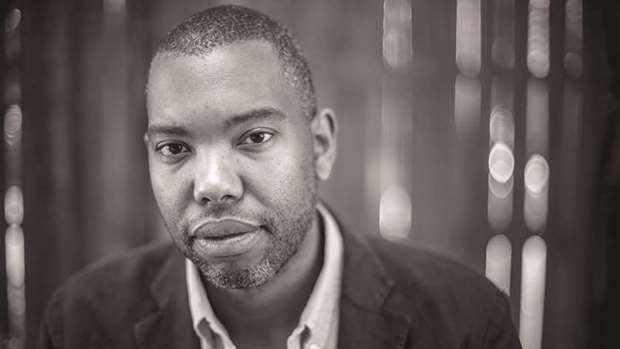While Barack Obama was making history as the country’s first black president, Ta-Nehisi Coates was becoming one of the premier voices in the country’s conversation about race.
His essays in The Atlantic, where he is a national correspondent, have been personal, historical, intelligent, angry — and full of hard truths that make white people squirm in their seats.
Which is why Coates’ words are so important. They teach people. They awaken them. Sentence by sentence, they are capable of closing the racial divide.
But is that racism, too? For a white person to look to someone of colour for guidance on issues of race and discrimination?
“I wouldn’t go that far,” said Coates, who has a new book, We Were Eight Years in Power.
“There might be reasons someone doesn’t want to take on that role,” he said of asking those who have been discriminated against to help others understand. “But I don’t think the request is another form of racism.”
Consider the #MeToo movement that has exposed sexual harassment and assault against women, he said.
“We have had … what feels like a parade of powerful men exposed for all the various ways they try to exploit their power,” he said. “Sexual access to women’s bodies. Rape. Assault.
“I am one who always thought of myself as relatively aware of sexual assault,” Coates continued. “But seeing this come out is different. And I have found myself in a situation that is not so dissimilar of white readers of my work: ‘I didn’t know it was this bad.’
“I find myself in the position of a well-intentioned man. It’s difficult. And it’s always difficult if you’re not part of the community, but part of the community that perpetrates the actual action.”
Coates’ new book is a collection of 16 essays written between 2008 and 2016. Half of them were written for The Atlantic and the rest were written specifically for the new book.
It is a follow-up to Between the World and Me, for which Coates won the 2015 National Book Award for Nonfiction, and for which he was a finalist for The Pulitzer Prize. The book spent more than a year on The New York Times best-seller list and has sold more than a million copies in print.
The new book includes essays like Fear of a Black President and The Case for Reparations, but also an epilogue that is The First White President, a widely shared piece that ran in the October issue of The Atlantic.
The essays examine Barack Obama’s time as America’s first black president through various prisms: Race, political power, historical context and impact on people like Coates, who tells his own story — and the country’s.
“There are no clean victories for black people, nor, perhaps, for any people,” Coates writes in My President Was Black.
“The presidency of Barack Obama is no different. One can now say that an African-American individual can rise to the same level as a white individual, and yet also say that the number of black individuals who actually qualify for that status will be small. One thinks of Serena Williams, whose dominance and stunning achievements can’t, in and of themselves, ensure equal access to tennis facilities for young black girls. The gate is open and yet so very far away.”
The essays begin with Coates as a young writer in the unemployment office in Harlem and end with him sitting in The Oval Office, interviewing the outgoing president.
In between, he became a necessary voice in the national conversation about race, about what Obama’s two terms meant — and how they ended with the election of President Donald Trump, a white man with no political experience.
You wonder if his election was — for lack of a better term — an overcorrection to an era where we saw the first black president, a woman as a major political-party nominee, same-sex marriage …
“There are things about the world that are changing and there is a coterie of Americans who don’t want it to change, and want the America of the ‘50s back. It sounds like Andy Griffith, but it means back-alley abortions and gays in the closet.
“Folks want their old world back,” he said. “That’s the basic clash.”
Coates writes with outrage, joy and resignation.
“Passion is a huge part of it,” Coates said. “I try to write about things I am very moved by. If you write too much, people become dead to it, so I try to pick my targets carefully.
“Some things are made for the dinner table or to talk about with your wife over coffee.”
Coates, 42 and the father of a 17-year-old son, lives in New York City. His wife, Kenyatta Matthews, is in medical school in Washington, D.C.
“We do what we have got to do to see each other,” he said.
He is also working on a three-book series of Black Panther graphic novels.
“It is my joy,” he said of writing — and reading — comics.
He just returned from Europe, where he had brief, but potent exchanges with cabdrivers about the state of American politics.
“They just look at you and say, ‘Trump,’?” he said. “I say, ‘I don’t know. Don’t blame me.’?”
You can hear the weariness in his voice. A mix of jet lag, missing his family, book-tour tiredness and pressure to explain so much to so many people.
Is that his joy, as well? The crowds? The questions? The conversations?
“Nope,” he said with a quiet laugh. “I detest it. I am happy that people want to read what I write, but … I don’t know. I probably don’t like a lot of attention.
“I appreciate the privilege,” he added quickly. “I am happy that folks are reading. As much as anything, it’s an attempt to keep myself grounded.” — The Seattle Times/TNS

.
